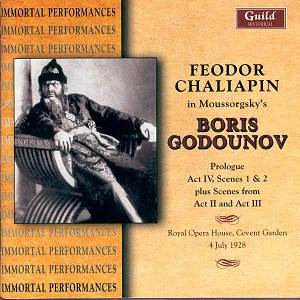The 4 July 1928 Covent Garden excerpts of Chaliapin’s
Boris Godounov have appeared in various guises before. Indeed it was
the appearance of an LP, RLS742, with the preserved sides and a subsequent
review that spurred Richard Caniell to exercise his judgement with regard
to the complexities regarding the lack of the Pimen scene in Act IV.
The fact that it was lacking meant that an interpolation was necessary
to ensure narrative flow, since this was the raison d’être of
Guild’s production. Twenty-one sides were recorded by HMV in 1928. The
EMI LP released, for the first time, the Pilgrim’s Chorus from the prologue
but Boris’s I am oppressed was damaged, as Caniell notes, and
a later Chaliapin recording of this, with Albert Coates, was substituted
"reshaping the sonics to match that of Covent Garden" to quote
Caniell. The main point of contention concerns the Pimen passage, which
is missing, as is the orchestral section which leads to Boris’ Farewell.
An interpolation, in Italian, by Nicola Moscona has been used instead,
elsewhere provisionally identified as a New York Metropolitan performance.
Richard Caniell has stated his position on this and other matters in
a long letter to this site and I would draw readers’ attention to it.
Irrespective of the complications implicit in this
kind of restoration the sound on this Guild disc is truly excellent
and the voices emerge with fidelity. Chaliapin’s voice saw surprisingly
little deterioration in quality of colour and depth in the years between
the first decade of the century and the early thirties; it remained
the noble and powerfully expressive instrument it always had been, allied
to his remarkable skills of impersonation. The characterization of Boris
was complete in its variety and depth. The otherwise near-all Italian
cast was a strong one – notably the buffo Baccaloni. Lavretzky incidentally
was sung by Dennis Noble. The orchestra is on notably well-behaved form,
responding fluidly to the direction of Vincenzo Bellezza. He is a forgotten
figure now but was a major conductor and had worked with Chaliapin in
1926 – recording with him as well. His discography is pitifully small
but this Boris goes some way to demonstrating why he was held in such
esteem – his rehearsals were meticulous even if his English was idiosyncratic.
He died in 1964 and this will remain probably his lasting – if incomplete,
necessarily imperfect – memorial. Documentation is good, in Guild’s
now accustomed livery, and the problems set out with clarity, though
the exact provenance of Moscona’s scene is not disclosed.
Jonathan Woolf
See also
Review by Calvin
Goodwin , Christopher
Fifield , Robert Farr
Letter received from
Richard Caniell regarding the Guild Historical series


